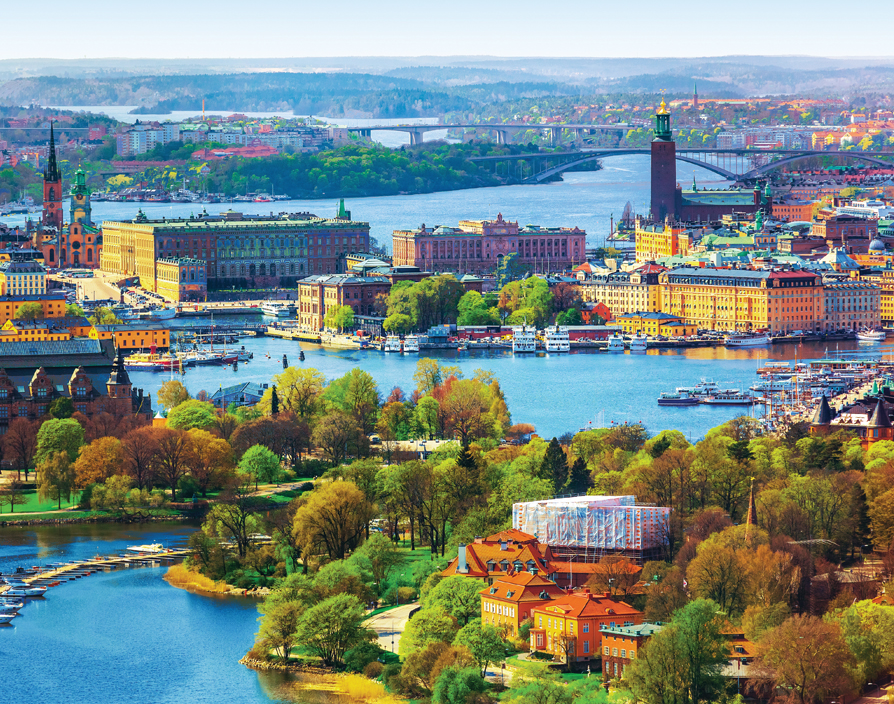Don’t think that you’re special. Dubbed the Law of Jante, in Sweden this widespread mentality suggested people who aspired to be innovative or to rise above their station should be met with condescension. But while this idea may have heavily influenced the psyche of Swedes in days gone by, a new generation of tech entrepreneurs from Stockholm are throwing the old rules out the window. “The notion that you shouldn’t consider yourself to be something is disappearing on the startup scene,” says Jessica Stark, CEO and co-founder of SUP46, the startup incubator. And there are certainly plenty of reasons for this change.
Just consider the fact that before Tim Cook signed off on the launch of Apple Music and music-streaming was on Jay Z’s radar, the founders of Spotify had already seen the music industry’s future. And it certainly wasn’t the first time a Swedish startup had predicted the way things were heading. While there are now no end to video-conferencing tools like Google Hangout and FaceTime, the Swedish entrepreneur Niklas Zennström and his co-founders got the drop on everyone when they launched Skype way back in 2003. But it’s no secret how Stockholm’s entrepreneurs have been able to take this lead. “We have an infrastructure that works,” says Måns Ulvestam, CEO and co-founder of Acast, the podcast platform. “If you take the underground in London your 4G connection doesn’t work and you can’t even text, while in Stockholm you can connect to the internet.”
Even though Sweden has a long history of inventors like Alfred Nobel and entrepreneurs like IKEA founder Ingvar Kamprad, the origins of Stockholm’s modern tech ecosystem has more to do with politics than any one person. Deciding in the 1990s to heavily invest in the country’s IT infrastructure, the government introduced high-speed internet and tax cuts for people buying a home computer. “These initiatives undoubtedly helped make the general population more aware and comfortable with technology,” says Sebastian Siemiatkowski, CEO and co-founder of Klarna, the provider of online payment services and one of the country’s six unicorns. “The government’s support has created a society that fosters innovation.”
The result of the Swedish government’s tech drive of the 1990s is that while Silicon Valley may be the undisputed champion of the world when it comes to producing unicorns, Stockholm comes a close second. According to SparkLabs, the seed-stage fund, the Californian city has produced 10.7 unicorns per million inhabitants, the Nordic city produced three and Tel Aviv, which came third, birthed 1.2. So it’s no wonder the European Digital City Index ranked the metropolis as Europe’s second best city after London when it comes to supporting its digital entrepreneurs. “In Stockholm, we’re really freaking good,” says Stark.
But even though access to a solid infrastructure has proven vital in fostering this thriving entrepreneurial community, it isn’t the only factor. Equally important for the success of Sweden’s startups is the fact that that the nation has a population of just under ten million, which means new enterprises have to be thinking about international expansion from the get-go. “If you’re in London or Berlin, you have 60 or 70 million people in your own country to sell to so it makes sense to only focus on the domestic market,” says Henrik Torstensson, CEO and co-founder of Lifesum, the fitness app. “But it’s impossible to grow in this country unless you have an eye on the international market, which is why it’s in our DNA to go global from the start.”
And the size of the country has also meant that Stockholm’s startups aren’t afraid to recruit talent from abroad. “If you’re running a startup with 50 or so people in your staff, you can be certain that there are at least five different nationalities among them,” says Torstensson.

When it comes to drawing in the best and brightest foreign talent, the Scandinavian capital has a couple of trump cards. Firstly, Sweden has a high level of English proficiency, which is only rivalled by two other non-native speaking countries – Denmark and the Netherlands. Secondly, the country has a solid reputation for equality, as evidenced by the fact it has the EU’s highest female employment rates, generous paternity leave laws and affordable childcare. “That has given us a really good reputation and has enabled us to recruit people who normally wouldn’t be interested in joining a startup,” says Karl Rosander, chief strategy officer and co-founder of Acast.
While the healthy influx of foreign talent jumping on the opportunity to join Stockholm’s vibrant ecosystem is certainly a welcome contribution, the city also has plenty of homegrown talent on hand to help launch startups. “Stockholm provides really good education for engineers,” says Ulvestam. For example, KTH The Royal Institute of Technology is ranked as one of the best mechanical engineering schools in the world, according to the QS World University Rankings. “Additionally we have people who’ve been working in the internet sector since the late 1990s,” continues Ulvestam. And the Swedish government has committed to continuing to feed this pipeline of domestic entrepreneurs: in 2009 it made nurturing entrepreneurial skills part of the Swedish school curriculum from pre-school up until secondary education.
However, some Swedish tech superstars still don’t think this is going far enough to ensure the ecosystem has access to a sufficient supply of technical talent. In 2016, Spotify’s founders pointed out in an open letter to the government that tech startups need programmers. They proposed that coding should also be introduced to Swedish schooling so the country “doesn’t lose out on the existing talent and to prevent female programmers” from disappearing from the talent pool.
And this isn’t the only stressor affecting the nation’s talent pool. The Swedish capital is also suffering from a severe housing crisis, which could limit startups’ chances to attract the expertise they need. “Housing is an enormous challenge in Stockholm,” says Torstensson. The problem isn’t the price – monthly rent for a 900-square-foot flat in Stockholm is around £1,660 compared to London’s £2,290 – but access to first-hand contracts. It was revealed last year that the rent-controlled housing queue would require someone to wait for 20 years – something that nearly saw the city issued with a Guinness World Record. According to the Swedish National Board of Housing, Stockholm would be required to annually build 88,000 new properties just to cover the current need. “You can get a subletting lease but usually with really shitty terms,” says Torstensson. “It really is a broken system.”
Nevertheless, Stockholm’s entrepreneurs are still more than able to convince investors that the city’s ecosystem is worth their while. “International investors seem to appreciate that Swedes are really humble,” says Stark. “We’re honest and don’t exaggerate but tell it like it is.” This humility has convinced investors to take a note out of Abba’s playbook and take a chance on Swedish startups. According to data from Nordic Web, the data-analysis firm specialising in the region’s tech startup scene, $1.48bn was invested in Stockholm in 2016, which is a 200% increase on the amount invested in 2015. This corresponded to 54% of the total amount invested in the Nordics last year. “And while there may not be enough data for 2017 yet, it certainly looks like this year is going to become even greater,” says Stark.
But Stockholm’s startups aren’t just attracting the interest of investors: they are also increasingly drawing the attention of those looking to buy. The community has witnessed some seriously high-profile exits over the years, such as Microsoft’s $8.5bn acquisition of Skype and Blizzard’s $5.9bn purchase of King, the makers of Candy Crush. And this has enriched the ecosystem in more ways than one: not only have these success stories provided inspiration for budding entrepreneurs, they’re also supplying startups with new sources of capital. For instance, Skype’s co-founder’s VC firm Atomico invested $90m in the unicorn Klarna in 2014. “Entrepreneurs who’ve made a lot of money are obviously going to invest back into the Swedish startup ecosystem,” says Ulvestam.
Given this healthy influx of money, most people in the startup scene seem enthusiastic about the future. “Stockholm will continue to be one of the leading cities in Europe,” says Torstensson. “We’ve created a strong foundation upon which to build a super-strong ecosystem.” It certainly seems as if the Law of Jante is on its way out: Stockholm’s entrepreneurs are proving themselves to be quite extraordinary.

Klarna
With an estimated value exceeding $2bn, the e-commerce company Klarna perfectly represents the potential of Stockholm’s startup scene. Founded while its three co-founders were still studying at the Stockholm School of Economics, the business demonstrates how the country is often ahead of the curve when it comes finding technological solutions. “Back in 2005, e-commerce was still trying to find its way,” says Sebastian Siemiatkowski, CEO and co-founder of Klarna. “The main payment method was credit cards but people were concerned about giving away their card info and they weren’t even sure whether or not they would get the product they ordered.”
Recognising that this was a golden opportunity for a startup to swoop in and solve consumers’ pain, Siemiatkowski and his co-founders launched Klarna. But Stockholm’s startup scene was still in its infancy back then, meaning it was difficult to get the resources needed to get a business off the ground. “Getting funding wasn’t easy back in 2005,” says Siemiatkowski. “Now incubators are much more common, providing support and funding to young companies.”
Fortunately, they eventually came into contact with an angel investor who spotted them the money they needed to launch Klarna. And in 2007, Investment AB Öresund, the investment firm, backed the company’s series A to the tune of $2.2m. In the decade since the business launched, Klarna has gone from strength to strength: it now employs over 1,200 people, is operating on two continents and has become one of Sweden’s six unicorns. But the founders have no plans of taking their foot of the accelerator just yet. “We always have on eye on the future,” concludes Siemiatkowski.
This story was updated on April 6 to avoid misunderstandings around Jay Z’s role at Tidal. ![]()
Share via:


















































